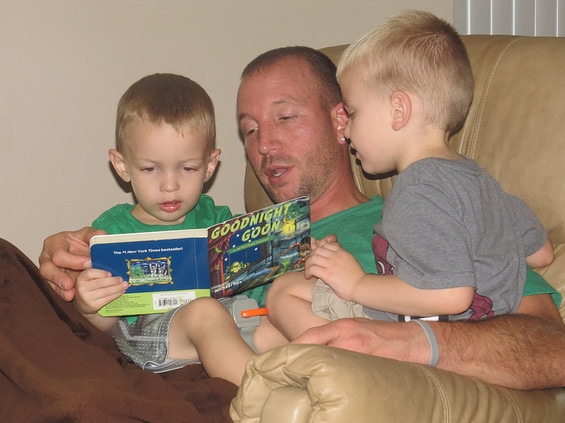|
Back to Blog
"interactive book reading has moderate-to-large effects on word learning by typically developing children and children with low vocabulary due to environmental differences in input." My first thought is HOW WONDERFUL that research is seeing this method is effective in both typically-developing children and children from low-income families! But my second thought is where does that leave the late-talkers or those diagnosed with a language delay or disorder? Limited research has been done in this area, but one preliminary study has shown that "parents can facilitate word use by children with language impairments" (Crowe, Norris, & Hoffman, 2004). In the meantime, Storkel, et al., 2017, suggests that parents and clinicians continue to target interactive book reading while waiting for the data to catch up. However, it is necessary that language outcomes be continually monitored by a speech-language pathologist to determine effectiveness of strategies. So now that we know that interactive book reading is still beneficial, how can you implement it at home as a parent and how can you support parents if you are a professional? As a parent and a speech-language pathologist, I know that there are challenges to having your child sit still on your lap, follow along, and listen. There are things that parents can do to make book reading not only more engaging for your child, but also even more effective for building language skills. Here are my 7 Tips for Effective Interactive Book Reading! 1. Pick an interesting book: Children learn best when they are engaged. Whether it's a book with textures or flaps for toddlers, a book about something new and exciting, or a book on your child's favorite topic, if it gets your child excited to pull it off the shelf you are off to a good start. 2. Ask questions: Open-ended questions are very insightful into your child's knowledge, opinions, and it helps to teach them about asking questions. You can even ask older children to predict what's going to happen next. 3. Encourage describing: As you go through the book, take time to look at the pictures. Have your child name items, characters, and actions they see on the page. Describe where things are and why they are happening to further expand your child's knowledge of concepts and they're problem-solving abilities. 4. Expand your child's expression: Whether your child uses no words, one word, or complete sentences, you can almost always find a way to build upon what they have just said. A good rule of thumb is listen to your child's nonverbal or verbal expression and expand by 1-2 words. (i.e. child says "cow", you then agree and acknowledge what they have said by saying "big brown cow"). If your child is using sentence level speech, consider adding a describing word or even restating the child's sentence with correct grammatical structure. (i.e. child says "Her says moo.", you say "Yes. She says moo.") 5. Do it Again: Repeating the same books that your child enjoys will ensure that reading is a positive experience. Also, any new concepts or vocabulary they are learning will become more ingrained in their memory with each repeat exposure. 6. Let your child help you read: Throughout the book, pause while you're reading and see if your child can fill in the blank. Make mistakes while your reading, even making it an obvious Uh-Oh. "Old MacDonald had a---Bicycle." See how your child reacts. Even if they have no reaction, you can express how silly that is, get them laughing and then continue on with your story. 7. Extend your learning to play: Keep in mind your child's attention span. Just because your child is done reading after the last page of your book, doesn't mean the learning has to stop there. Try to extend the topic of your book (i.e. farm animals) to what your child wants to play with. Don't worry if you don't have the matching toy set for that particular book. Pretend with your child. Maybe you both can pretend to be animals as you move about your house or build a barn out of blocks with your child. If your child is a late-talker or diagnosed with a speech/language impairment, Contact Us for a FREE consultation to see if we can help you develop a plan for how to expand your child's speech and language skills using interactive book reading or provide advice on other therapy methods. For more information on interactive book reading (also known as shared book reading) visit www.asha.org. To receive a Handout copy of 7 Tips for Effective Interactive Book Reading and for monthly updates on blog posts and future resources as they become available, contact us. References
1 Comment
Read More
|
Serving the Following Foothill Communities:
Pollock Pines Camino Placerville Diamond Springs Pleasant Valley
Coloma Somerset Garden Valley Georgetown
Rescue Shingle Springs Cameron Park El Dorado Hills Folsom Cool
Pollock Pines Camino Placerville Diamond Springs Pleasant Valley
Coloma Somerset Garden Valley Georgetown
Rescue Shingle Springs Cameron Park El Dorado Hills Folsom Cool
Black Oak Therapy
530-728-0757
1160 Suncast Ln Suite 9
El Dorado Hill, CA 95762
[email protected]
Fax: 530-718-3527
530-728-0757
1160 Suncast Ln Suite 9
El Dorado Hill, CA 95762
[email protected]
Fax: 530-718-3527
Proudly powered by Weebly


